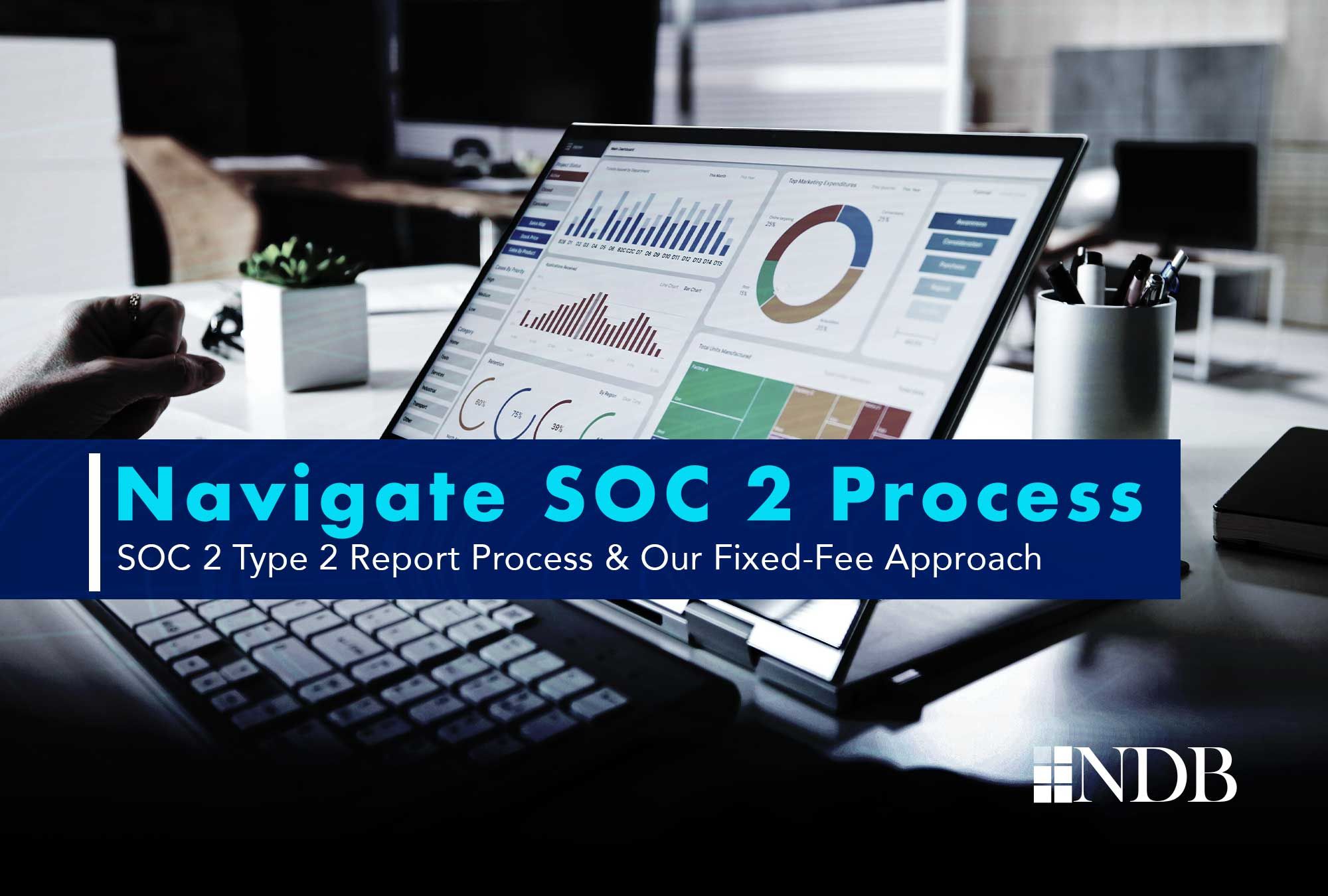Navigating the SOC 2 Type 2 Report Process and NDB’s Fixed-Fee Approach
As companies continue to expand their digital presence, protecting sensitive information and ensuring secure system operations has become more essential than ever. Organizations that handle sensitive data, especially those offering services to other businesses, must demonstrate their commitment to security and operational integrity. The SOC 2 Type 2 Report provides businesses with a critical way to validate their security measures to clients, stakeholders, and regulatory bodies.
This white paper aims to offer a comprehensive understanding of the SOC 2 Type 2 Report, detailing what it is, why it’s important, and how it benefits businesses. Additionally, we will explore the types of companies that typically require SOC 2 Type 2 reports, best practices for preparing for the audit, common pitfalls to avoid, and how NDB, a nationally recognized CPA firm, offers a unique fixed-fee structure for SOC 2 Type 2 reports, making the process more efficient and predictable for our clients.
What is a SOC 2 Type 2 Report?
The SOC 2 audit is a framework established by the American Institute of Certified Public Accountants (AICPA) to evaluate how well an organization manages and secures sensitive data. The SOC 2 audit focuses on five key trust service criteria:
- Security: The protection of systems and data from unauthorized access.
- Availability: The accessibility of systems and data as agreed upon with clients.
- Processing Integrity: Ensures that data processing is complete, accurate, and timely.
- Confidentiality: The protection of sensitive information from unauthorized access.
- Privacy: Safeguarding personal data and ensuring compliance with privacy regulations.
There are two types of SOC 2 reports:
- SOC 2 Type 1 Report: Evaluates the design and implementation of an organization’s controls at a specific point in time.
- SOC 2 Type 2 Report: Extends the evaluation to assess how well those controls operated over a period of time (usually 6 to 12 months).
A SOC 2 Type 2 report is crucial because it demonstrates that an organization’s controls were not only properly designed but also effectively operated during the review period, instilling confidence in clients, partners, and regulators.
Types of Companies That Do SOC 2 Type 2 Reports
SOC 2 Type 2 reports are generally relevant to companies that manage or process sensitive information or provide technology-driven services. Industries that typically require a SOC 2 Type 2 report include:
-
SaaS (Software-as-a-Service) Providers
SaaS companies are prime candidates for SOC 2 Type 2 audits because they handle customer data and often operate in highly regulated industries. A SOC 2 Type 2 report assures customers that their data is secure and the software performs as expected.
-
Cloud Service Providers
Companies offering cloud hosting or cloud storage solutions, such as AWS, Google Cloud, or Microsoft Azure, need to demonstrate the effectiveness of their controls over their infrastructure. A SOC 2 Type 2 report is essential for these companies to prove they meet industry standards for security and availability.
-
Financial Institutions
Banks, fintech companies, and investment firms are frequently required to undergo SOC 2 Type 2 audits due to the sensitivity of the financial data they handle. The report helps demonstrate compliance with stringent financial regulations and enhances trust with clients and stakeholders.
-
Healthcare Organizations
With increasing concerns about data privacy under regulations such as HIPAA, healthcare providers, insurers, and technology vendors that serve the healthcare industry often rely on SOC 2 Type 2 audits to confirm that they meet security and confidentiality requirements.
-
E-commerce and Retail Platforms
Companies involved in e-commerce that store, or process customer payment information or other personal data can benefit from SOC 2 Type 2 reports to establish credibility and prove that they are committed to safeguarding customer data.
-
Third-Party Service Providers
Any company that offers third-party services, especially in IT, data processing, or consulting, needs to demonstrate strong internal controls. These companies rely on SOC 2 Type 2 reports to reassure clients that their sensitive information is being managed securely and responsibly.
SOC 2 Type 2 reports are not industry-specific; rather, they’re essential for any organization that wants to prove its dedication to information security and operational excellence. As security and privacy concerns continue to rise, a SOC 2 Type 2 report can make a significant difference in securing new business and retaining clients.
Best Practices for Preparing for a SOC 2 Type 2 Audit
Successfully preparing for a SOC 2 Type 2 audit requires both planning and collaboration. Below are some best practices to ensure the audit process goes smoothly:
-
Understand the Trust Service Criteria
Before beginning the audit, ensure your company is well-versed in the five trust service criteria: Security, Availability, Processing Integrity, Confidentiality, and Privacy. Each criterion requires specific controls to be in place, and having a solid understanding of these areas is critical to successful preparation.
-
Define and Implement Proper Controls
SOC 2 Type 2 audits evaluate both the design and effectiveness of your controls. Work with your IT, security, and compliance teams to define internal controls that address each of the trust service criteria. These controls should be documented and integrated into your daily operations.
-
Keep Detailed Documentation
Effective documentation of all processes, policies, and procedures is essential for a smooth audit. Auditors will review this documentation to assess whether your controls are being followed and maintained. Ensure that any changes or updates to your systems or procedures are well-documented.
-
Conduct a Self-Assessment
Prior to the official audit, perform a self-assessment to identify potential gaps in your controls. This allows you to address any weaknesses or deficiencies before the formal audit process begins, saving time and avoiding surprises during the audit.
-
Provide Ongoing Training
Security and compliance are ongoing commitments. Regularly train employees on security practices, data privacy, and the importance of following internal policies. Ensure that your staff is aware of their role in maintaining security and compliance.
Common Pitfalls to Avoid During a SOC 2 Type 2 Audit
While preparing for and undergoing a SOC 2 Type 2 audit can be a smooth process, certain pitfalls are common. Being aware of these issues can help your company avoid unnecessary delays or complications:
-
Lack of Preparation
Failing to thoroughly prepare for the audit is one of the most significant mistakes companies make. Without proper controls, documentation, or readiness, audits can drag on and increase costs. It’s important to take the time to prepare well in advance.
-
Inadequate Control Implementation
Having policies in place is important, but they must be effectively implemented and followed. A gap between policy and practice can result in a failed audit. Regularly monitor and test controls to ensure they are working as intended.
-
Unclear Ownership
A successful SOC 2 Type 2 audit requires clear ownership of controls and responsibilities. Ensure that roles are clearly defined, and individuals or teams are responsible for ensuring that the controls are operational and adhered to consistently.
-
Rushing the Process
SOC 2 audits are detailed, and rushing through the process can lead to incomplete or inaccurate reporting. Allow sufficient time to properly document your controls, conduct internal tests, and address any weaknesses before the formal audit begins.
-
Underestimating the Need for Continuous Improvement
A SOC 2 Type 2 audit isn’t a one-time event; it’s an ongoing commitment. Continuously monitor and improve your controls to stay ahead of emerging threats and regulatory changes. A successful audit today doesn’t mean you can relax your efforts going forward.
NDB’s Fixed-Fee Approach to SOC 2 Type 2 Reports
At NDB, we understand that SOC 2 Type 2 audits can seem complex and expensive, particularly when companies are unsure of the costs involved. That’s why we offer a fixed-fee approach to SOC 2 Type 2 audits. This approach ensures that you can accurately budget for the audit process with no surprise costs along the way.
Why Choose NDB’s Fixed-Fee Model?
-
Predictability
With a fixed-fee structure, you know exactly what you’ll be paying for the entire audit process. No hourly billing means there are no unexpected charges, giving you peace of mind as you budget for your audit.
-
Transparency
We believe in clear communication and transparency. Our clients are fully informed of the audit process and costs, and we provide comprehensive support every step of the way.
-
Expert Guidance
Our team of experienced professionals works closely with your company to ensure you meet all necessary criteria. We guide you through the preparation process, ensuring the audit runs efficiently, and help you address any gaps in your controls.
-
Cost-Effective
The fixed-fee approach ensures cost-effectiveness by eliminating unnecessary expenses. We focus on delivering value without compromising the quality or thoroughness of the audit.
NDB – Leaders in SOC 2 Type 2 Reports
The SOC 2 Type 2 Report has become an essential tool for companies that manage sensitive data and provide services to others. By demonstrating the effectiveness of your controls, a SOC 2 Type 2 report helps establish trust with clients and stakeholders while mitigating risks associated with data security and operational performance.
At NDB, our fixed-fee approach to SOC 2 Type 2 audits makes the process straightforward, transparent, and budget-friendly. We are committed to helping businesses achieve compliance with ease while ensuring they maintain the highest standards in data security and privacy.
For more information about how NDB can support your SOC 2 Type 2 audit needs, contact us today to schedule a consultation. We’re here to make the audit process as seamless as possible while providing exceptional value.




